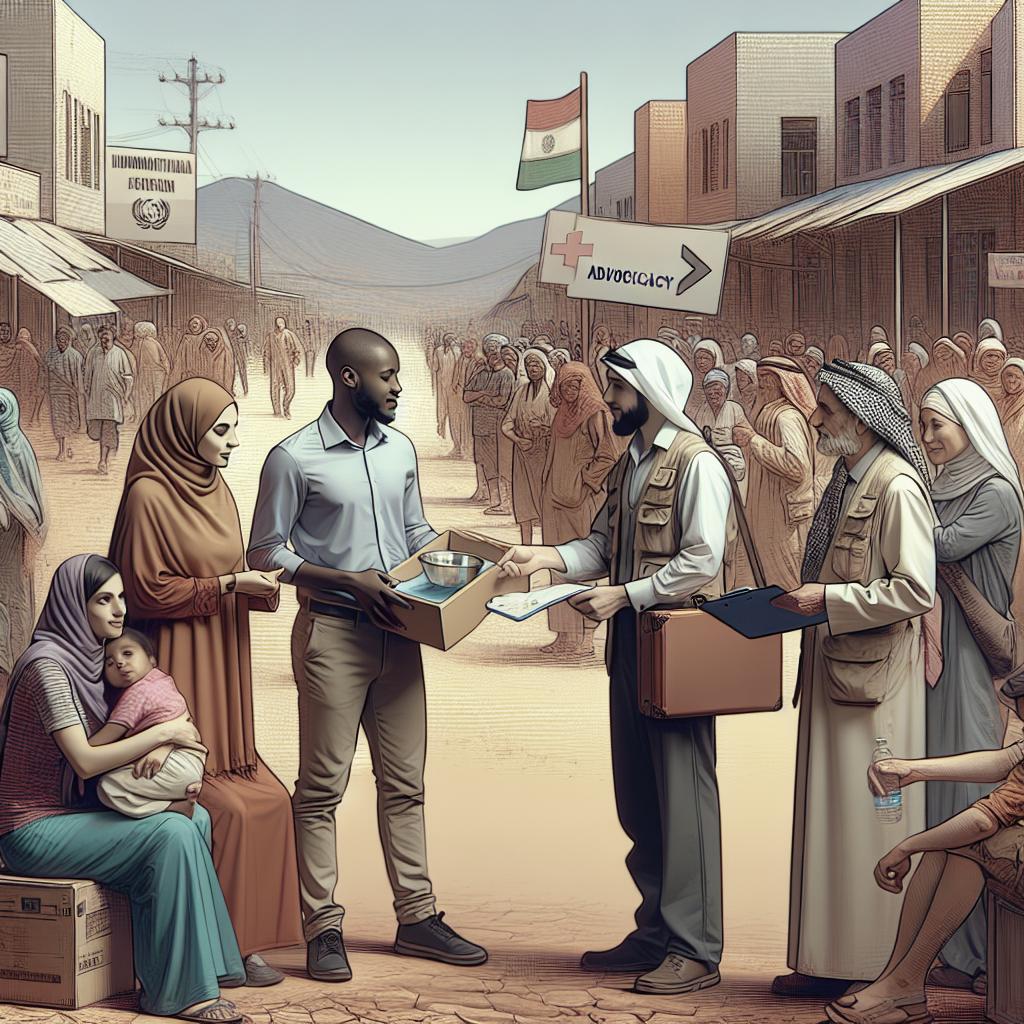Humanitarian work goes beyond providing immediate relief during crises; it also involves advocacy—efforts aimed at influencing policies and practices to ensure long-term solutions. Through advocacy, humanitarian organizations engage with governments, address critical issues like access to medicines and gaps in global aid, and focus on specific crises such as the Rohingya displacement. This blog post delves into the various aspects of advocacy in humanitarian work. We’ll explore advocacy with governments, examine specific advocacy issues, review relevant analysis articles, and look at available advocacy resources. Such work ensures that humanitarian efforts are sustainable and impactful.
Advocating with governments
Advocating with governments is a cornerstone of humanitarian work. It involves influential dialogues and negotiations aimed at shaping policies that align with humanitarian objectives. Engaging with governments helps ensure that relief efforts are supported and sustained through legislative and policy changes. Humanitarian bodies often collaborate with government agencies to implement joint initiatives, ensuring that aid reaches those who need it most.
Furthermore, governments play a critical role in providing the necessary resources and creating an enabling environment for humanitarian operations. By fostering positive relationships and maintaining open lines of communication, humanitarian organizations can advocate for changes in policies and regulations, which are crucial for ensuring access to affected populations and the continual provision of necessary services.
ECOSOC Humanitarian Affairs Segment
The United Nations Economic and Social Council (ECOSOC) Humanitarian Affairs Segment is an annual event that serves as a platform for discussing global humanitarian policies and strategies. It brings together member states, UN agencies, non-governmental organizations, and other stakeholders to discuss pressing humanitarian challenges and the best ways to address them.
During these sessions, advocacy plays a significant role as organizations present their findings, share experiences, and propose actionable recommendations. This segment also allows for the dissemination of critical data and insights, which can influence international humanitarian policies and funding priorities. The discussions and decisions made here are pivotal in shaping global humanitarian response strategies.
Advocacy issues
Access to medicines
One of the most pressing advocacy issues in humanitarian work is access to medicines. Many communities, especially in developing countries, face barriers to obtaining essential medicines due to factors like cost, availability, and regulatory challenges. Advocacy efforts aim to address these barriers by pushing for more equitable distribution systems and cost reductions.
Humanitarian organizations work closely with pharmaceutical companies, international bodies, and governments to negotiate better terms for drug access. They also advocate for policies that promote the production of generic medicines and encourage research into diseases that predominantly affect low-income populations, ensuring that life-saving treatments are available to all.
Gaps in global aid
Gaps in global aid are another critical advocacy issue. Disparities in the distribution of humanitarian aid often mean that the most vulnerable populations, particularly in remote or politically unstable regions, do not receive the help they need. Advocacy efforts focus on highlighting these gaps and pushing for more balanced and inclusive aid distribution frameworks.
By conducting research and publishing reports, humanitarian organizations bring attention to neglected crises and advocate for the reallocation of resources. They work to ensure that all affected populations are considered in aid policies, not just those in high-profile conflicts.
HIV/AIDS, tuberculosis, and malaria
Advocacy in the fight against HIV/AIDS, tuberculosis, and malaria is vital in humanitarian work. These diseases disproportionately affect impoverished communities and require sustained international attention and funding. Advocacy efforts here focus on raising awareness, increasing funding for research and treatment, and pushing for comprehensive healthcare policies that prioritize these diseases.
Organizations advocate for the integration of these disease control programs into national health strategies and for the removal of stigmas associated with these illnesses. They also push for international cooperation to tackle these global health threats comprehensively.
The Rohingya displacement crisis
The Rohingya displacement crisis is a significant focus of humanitarian advocacy. This ethnic minority group has faced severe persecution and has been forced to flee their homes in Myanmar, leading to one of the most urgent refugee crises in recent history. Advocates work to bring international attention to the plight of the Rohingya people and push for political solutions to their persecution.
Humanitarian organizations also advocate for immediate relief, including access to safe shelters, healthcare, and education for displaced Rohingya. Additionally, they call for accountability for human rights abuses and work towards long-term solutions that would allow the Rohingya to return home safely and with guaranteed rights.
Analysis articles
Analysis articles serve as an essential tool in humanitarian advocacy by providing in-depth examinations of ongoing crises and the effectiveness of current interventions. They are instrumental in shaping public opinion and influencing policy decisions. Quality analysis often involves extensive field research and first-hand accounts, which offer a comprehensive understanding of complex humanitarian issues.
These articles help to identify gaps in current humanitarian responses and suggest changes or improvements. By disseminating these analyses through various media platforms, humanitarian organizations can reach a broader audience, including policymakers, donors, and the general public, thereby facilitating informed decision-making and resource allocation.
Advocacy resources
Advocacy resources are vital for empowering humanitarian organizations and individuals engaged in advocacy work. These resources can include toolkits, training manuals, policy briefs, and databases that provide essential information and strategies for effective advocacy. They offer frameworks for developing advocacy campaigns, engaging stakeholders, and measuring impact.
Additionally, online platforms and networking opportunities allow advocates to share best practices and coordinate efforts. By leveraging these resources, humanitarian organizations can enhance their advocacy efforts, ensuring they are strategic, well-informed, and impactful in promoting sustainable humanitarian solutions.
Future prospects
| Category | Details |
|---|---|
| Advocating with governments | Engaging in policy dialogues, shaping legislative changes, ensuring sustained relief efforts through government collaboration. |
| ECOSOC Humanitarian Affairs Segment | Annual UN event for discussing global humanitarian policies, shaping international response strategies. |
| Advocacy issues |
|
| Analysis articles | In-depth examinations of crises, influencing public opinion, and shaping policy decisions. |
| Advocacy resources | Toolkits, training manuals, policy briefs, and online platforms for effective advocacy strategies. |

Leave a Reply